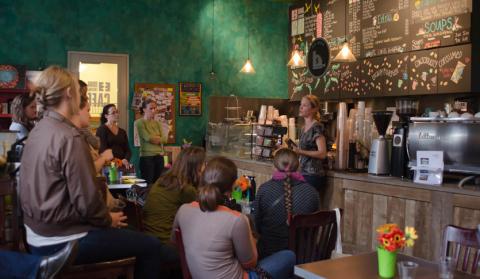
Excerpted from The Democracy Collaborative report, Strategies for Financing the Inclusive Economy, originally published September 2016. (Photo: Joe Driscoll, Creative Commons licensing)
Massachusetts-based Equal Exchange is a $60 million importer and wholesaler of high quality, organic coffee, tea, olive oil, bananas, and other foods to customers across the U.S. All Equal Exchange products are intended to benefit its suppliers, who include more than 50 small farmer co-operatives in 40 countries around the world. This approach, known as fair trade, is one that Equal Exchange was a pioneer in creating. It has pioneered in another area as well, using the sale of preferred shares to impact investors as a way to bring some $16 million in financing into a worker-owned cooperative.
Preferred shares are a form of equity with limited voting rights, where the stock price does not rise over time and investors instead enjoy a stream of dividends. Equal Exchange's annual dividends have fairly consistently been 5 percent annually over fifteen years. This reliable—and today, relatively handsome—return on investment has enabled Equal Exchange to raise more than $16 million using this method. Most recently, in April 2015 the 120-member worker cooperative completed an offering of $4 million in preferred shares. This was the largest stock sale ever by a worker co-op in North America.

As Daniel Fireside and Rodney North of Equal Exchange wrote recently, "This isn't high-stakes venture capital where backers expect the company to either sell out or go public. Instead it's slow financing from over 600 people and institutions that share the company's values, and who want to help it grow without ever putting those values at risk, or undermining the absolute control" of worker-owners. The model was introduced to Equal Exchange by Boston's ICA Group, which has been supporting worker-owned enterprises for 40 years.
Fireside and North report that as a result of the use of preferred stock, Equal Exchange now has twice as much equity capital as debt. That gives it its pick of possible lenders. The company borrows from mission-aligned entitles such as the Cooperative Fund of New England, National Cooperative Bank, the Calvert Foundation, and RSF Social Finance.

